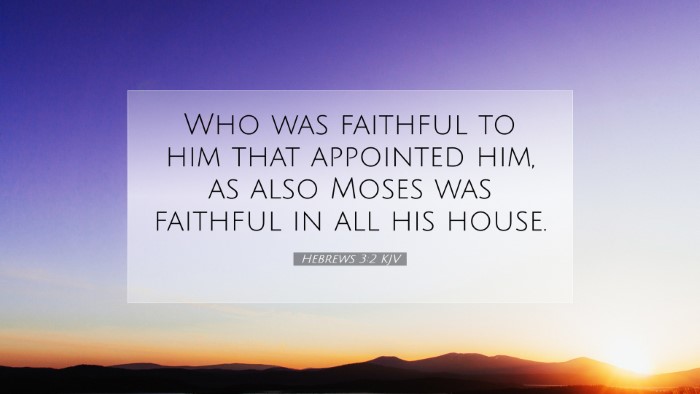Old Testament
Genesis Exodus Leviticus Numbers Deuteronomy Joshua Judges Ruth 1 Samuel 2 Samuel 1 Kings 2 Kings 1 Chronicles 2 Chronicles Ezra Nehemiah Esther Job Psalms Proverbs Ecclesiastes Song of Solomon Isaiah Jeremiah Lamentations Ezekiel Daniel Hosea Joel Amos Obadiah Jonah Micah Nahum Habakkuk Zephaniah Haggai Zechariah MalachiHebrews 3:2
Hebrews 3:2 KJV
Who was faithful to him that appointed him, as also Moses was faithful in all his house.
Hebrews 3:2 Bible Commentary
Commentary on Hebrews 3:2
Bible Verse: "Who was faithful to him that appointed him, as also Moses was faithful in all his house."
Introduction
The epistle to the Hebrews presents profound theological insights on the supremacy of Christ. In Hebrews 3:2, the writer draws a comparison between Christ and Moses, illustrating Christ’s faithfulness. Understanding this text is vital for pastors, students, theologians, and Bible scholars as it reflects on themes of authority and faithfulness.
Faithfulness of Christ
Hebrews 3:2 highlights Christ's faithfulness to His divine appointment. The term "faithful" is pivotal, indicating a steadfast commitment to the mission given by God.
- Matthew Henry: Comments on the importance of Christ's role as the Apostle and High Priest, emphasizing His fidelity to the task entrusted to Him by the Father. He notes, “He was faithful in all things; His faithfulness extends to every detail.”
- Albert Barnes: Reflects on the nature of this faithfulness, noting that Christ’s obedience unto death is the ultimate fulfillment of His mission, signifying a faithfulness that exceeds that of Moses.
- Adam Clarke: Argues that the faithfulness of Christ was evidenced during His earthly ministry and continues in His intercession for believers, demonstrating an unwavering commitment to God’s redemptive plan.
Comparison with Moses
The text presents Moses as a servant in God’s house, whereas Christ is likened to a son over the house. This contrast serves to elevate Christ’s position and the greater covenant He mediates.
- Matthew Henry: states that while Moses is honorable as a servant, his authority is limited. He emphasizes that Moses' faithfulness was indeed significant but ultimately serves to point to Christ's superior faithfulness.
- Albert Barnes: Examines the role of Moses as the lawgiver and mediator of the old covenant, explaining how his faithfulness laid the groundwork for the coming of Christ, who initiates a new covenant.
- Adam Clarke: Explores the implications of viewing Moses in this light, acknowledging that while Moses was faithful in God’s house, Christ, as the Son, possesses authority that surpasses that of Moses, thus embodying the fulfillment of God's promise.
Theological Implications
The nuanced understanding of faithfulness in Hebrews 3:2 encourages readers to consider their own faithfulness in carrying out God’s calling. The faithfulness of Christ should inspire believers to emulate His commitment to God's purpose.
- Devotional Application: Pastoral leaders must encourage congregants to reflect on their own roles within the community of faith, drawing parallels from Christ’s faithfulness.
- Scholarly Reflection: The faithful character of Christ invites deeper theological reflection on the nature of God’s mission, illuminating how faithfulness transcends mere duty and enters the realm of relational commitment.
Conclusion
Hebrews 3:2 serves as a powerful reminder of the call to faithfulness. In comparing Christ to Moses, the author not only affirms Christ's divine appointment but also challenges believers to examine their own faithfulness in light of Christ's example. The insights gleaned from public domain commentaries enrich our understanding and encourage both personal reflection and communal worship centered on the faithfulness of Christ.


